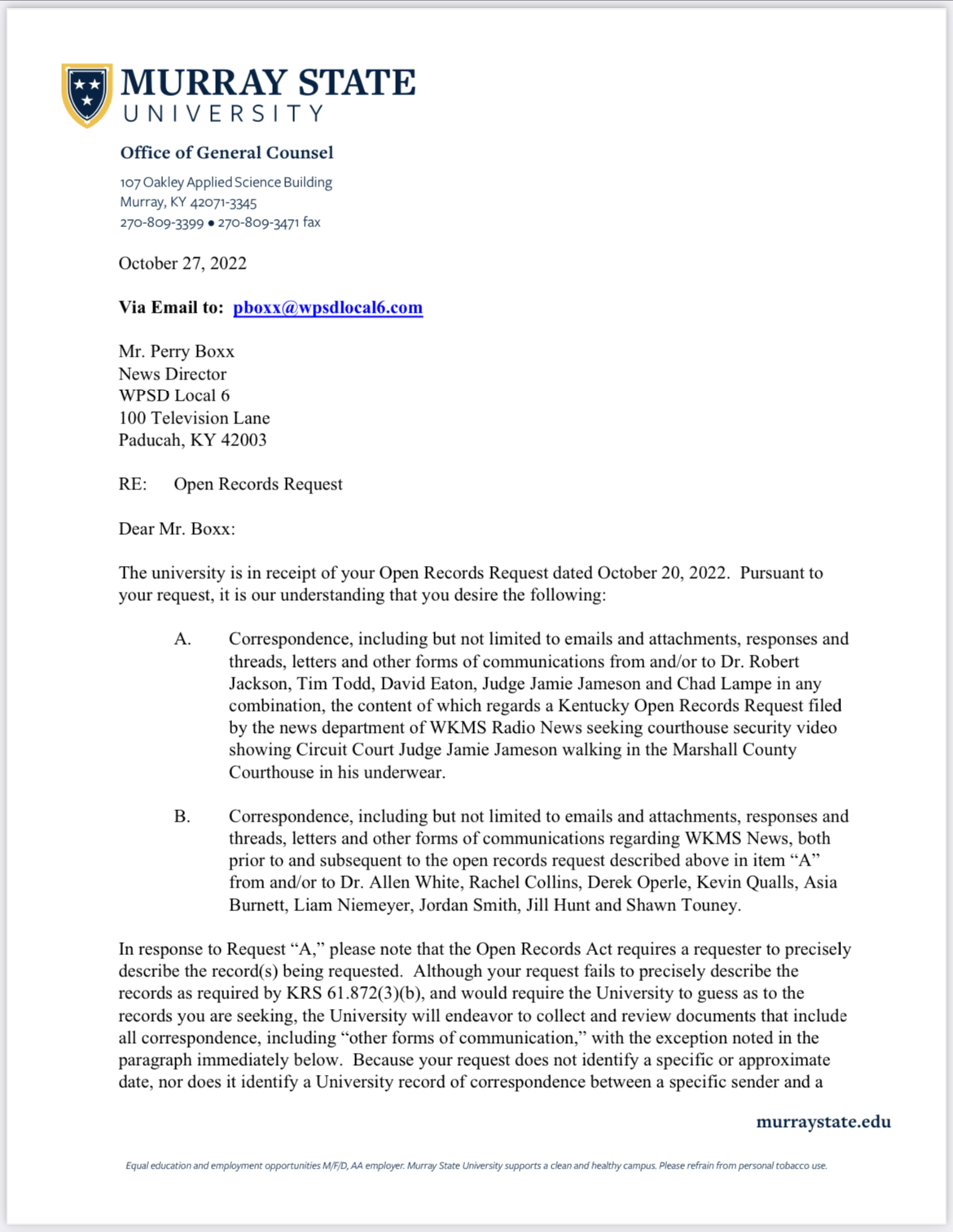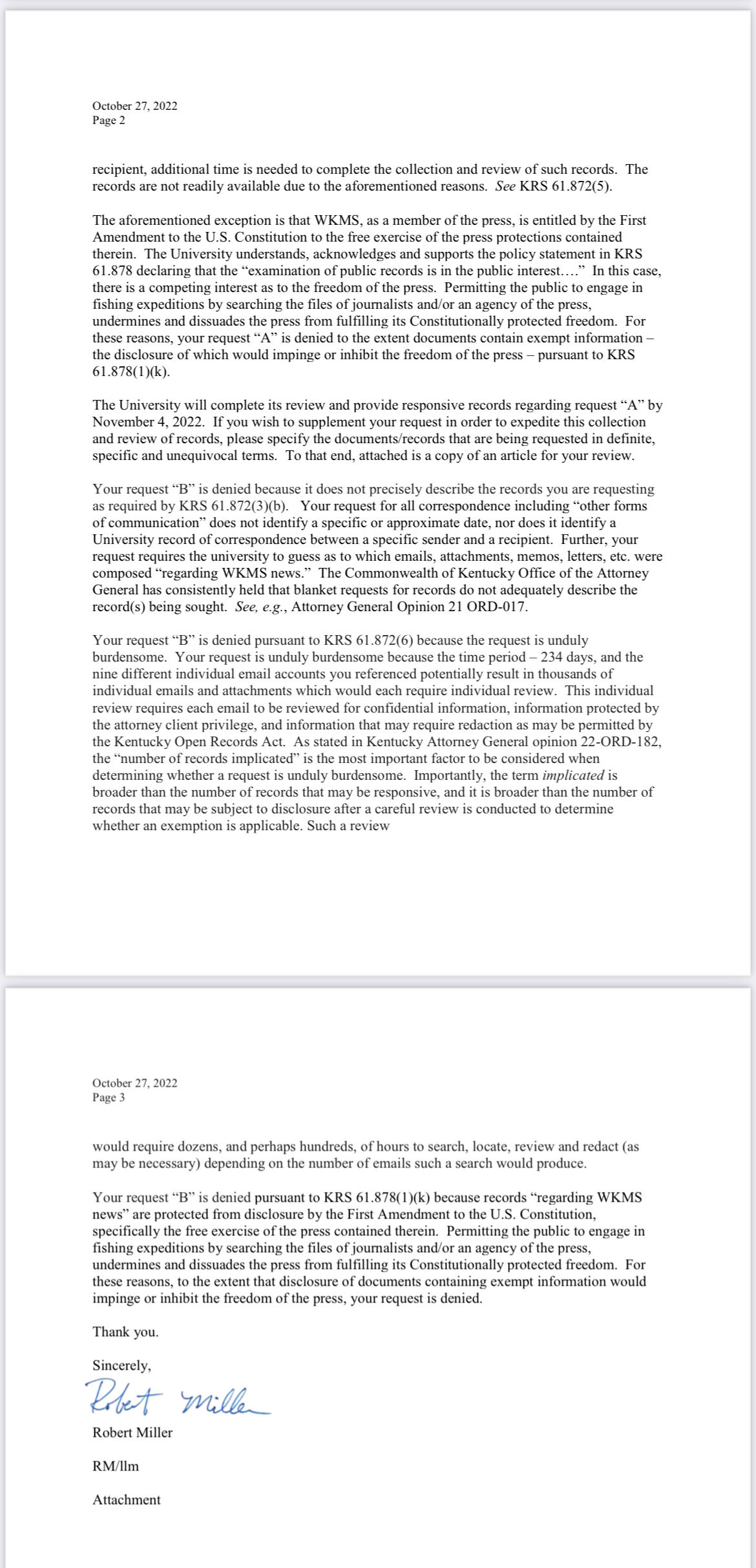

A new “horrible” has joined the “parade of horribles” associated with public university abuse of the open records law: invocation of the First Amendment to deny a public records request.
The First Amendment as the enemy of the public’s right to know? Who could have imagined?
We’ve witnessed universities that consistently ignore their basic statutory duties under the law (University of Kentucky); universities that cite the current attorney general’s textually erroneous interpretation of “public records” to deny the public access to public officials’ and employees’ communications about public business on private devices and accounts (also the University of Kentucky); universities that litigate settled open records law to evade accountability (Kentucky State University Foundation); universities that make entirely unsubstantiated claims that a miscited open records exception for proprietary records/trade secrets authorizes redaction of “hospitality services” from a public contract for the services of a former NBA star (Western Kentucky University); and the first rumblings of universities that may be attempting to intimidate and silence critics by submitting open records requests to faculty and staff for their records (Morehead State University).
Enter Murray State University.
In a move that shocks the most benumbed conscience, Murray State has advanced the unprecedented claim that the First Amendment — which declares that “Congress shall make no law respecting an establishment of religion, or prohibiting the free exercise thereof; or abridging the freedom of speech, or of the press; or the right of the people peaceably to assemble, and to petition the Government for a redress of grievances” — authorized denial of an open records request submitted by WPSD news director Perry Boxx.
What is Murray State’s legally unsupportable theory?
The First Amendment is a “federal law or regulation” prohibiting the disclosure of public records or information under an open records exception found at KRS 61.878(1)(k).
https://apps.legislature.ky.gov/law/statutes/statute.aspx?id=51393
Let’s put a mercifully quick end to this indefensible argument.
The First Amendment does not implicitly or explicitly prohibit the disclosure of public records or information. The cited open records exception is “facially inapplicable.”
HIPAA is a federal law that prohibits “covered entities” that are also public agencies — for example, a public ambulance service — from releasing certain records or information. FERPA is a federal law that prohibits “educational institutions” — for example, public schools and universities — from disclosing certain records or information. The Driver’s Privacy Protection Act is a federal law that prohibits motor vehicle departments — for example, county clerks — from disclosing certain records or information.
The First Amendment erects no barrier to public information. It is not a federal law or regulation that prohibits disclosure of public records. Murray State’s argument is a textual non-starter and, frankly, deeply offensive.
This latest university affront to the open records law began with Boxx’s October 20 request for communications exchanged by Murray State President Robert Jackson, then-Marshall and Calloway County Circuit Court Judge Jamie Jameson, Murray State public radio affiliate WKMS Station Manager Chad Lampe, and other identified individuals — relating to an earlier open records request submitted by WKMS’s news department for courthouse security video showing Judge Jameson walking through the courthouse in his underwear.
On behalf of the university, Murray State’s general counsel trotted out the easily refutable argument that Boxx’s request was “insufficiently specific” — a lowest common denominator argument gaining wide popularity in the public agency playbook.
To our astonishment, Murray State’s general counsel then advanced the “novel” claim that disclosure of records related to a press open records request in response to a press open records request would violate freedom of the press:
“Permitting the public to engage in fishing expeditions by searching the files of journalists and/or an agency of the press, undermines and dissuades the press from fulfilling its Constitutionally protected freedom. For these reasons, your request is denied to the extent documents contain exempt information – the disclosure of which would impinge or inhibit the freedom of the press – pursuant to KRS 61.878(1)(k).”
Everyone — with the exception of Murray State University — appreciates the irony of this position. Boxx did not ask to search the files of journalists or “an agency of the press” — whatever that is.
He requested records that relate to a deeply disturbing episode involving a since-removed circuit court judge who attempted to use his influence with ranking university officials — including Murray State president Robert Jackson — to kill an embarrassing story by Murray State’s public radio affiliate about the judge traipsing around the courthouse in his underwear, and an equally embarrassing story about university officials’ responses to the Judge’s influence peddling.
Was it press freedom Murray State was determined to protect in invoking the First Amendment to deny the press’s public records request?
Or was it a university administration that yielded to the judge’s unethical entreaties to kill the story and thereafter attempted to silence the press.
The Kentucky Open Government Coalition firmly believes that the open records appeal — soon to be filed on behalf of Perry Boxx and WPSD by Louisville attorneys Michael Abate and Rick Adams — will confirm the latter and that the communications it unearths will expose an unrivaled level of university cynicism and duplicity.


